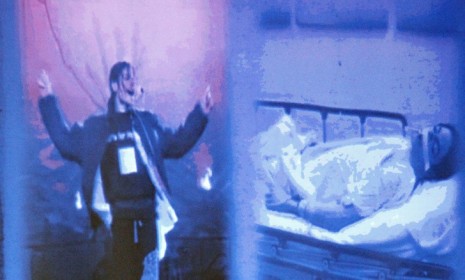The 'emotional' Michael Jackson death trial: 5 talking points
The manslaughter trial of Dr. Conrad Murray, Jackson's personal doctor, began Monday. Here's what you need to know

The trial of Conrad Murray, Michael Jackson's personal doctor, began Monday in Los Angeles. Murray is being charged with manslaughter for allegedly administering the anesthetic that killed the King of Pop in 2009. What do you need to know about the trial so far? Here, five talking points:
1. Prosecutors claim Murray is single-handedly responsible for Jackson's death
In his opening statements, Deputy District Attorney David Walgren charged that Murray "repeatedly acted with gross negligence," and that his "repeated incompetent and unskilled acts" led to Jackson's death. Walgren said Murray, "with his eyes on an anticipated $150,000 (per month)," used the surgical anesthetic propofol to get Jackson to sleep each night, "even though it has no known application as a sleeping aid," and administered it without proper monitoring equipment. Murray also waited 25 minutes to call 911 after finding Jackson unresponsive, and failed to report the singer's use of propofol, even though he was "specifically asked" about it.
The Week
Escape your echo chamber. Get the facts behind the news, plus analysis from multiple perspectives.

Sign up for The Week's Free Newsletters
From our morning news briefing to a weekly Good News Newsletter, get the best of The Week delivered directly to your inbox.
From our morning news briefing to a weekly Good News Newsletter, get the best of The Week delivered directly to your inbox.
2. The defense claims that Jackson's death was a suicide
Murray's defense lawyer, Ed Chernoff, said Jackson was responsible for his own death. The defense theory is that Jackson "took the drugs himself because Murray refused to give them to him." Chernoff said the singer woke up and, while Murray was not in the room, gave himself enough extra propofol to create a "perfect storm" that killed him "so instantly he didn't even have time to close his eyes." Murray previously told investigators that Jackson used propofol to treat insomnia — "calling it his 'milk'" — and that he was weaning the singer, who weighed only 136 pounds, off an addiction to the drug.
3. The jury is seeing and hearing some jarring evidence
The prosecution projected a photo in the courtroom showing "Jackson's lifeless body on a hospital gurney under the powerful heading 'Homicide,'" says Nancy Dillon in the New York Daily News. According to TMZ, the photo was given a "murky, gritty treatment," and "was clearly touched up to look as daunting as possible." Jurors also heard an "eerie recording" recovered from Murray's cell phone, says Caroline Bankoff at New York. In it, a "slurring, incoherent" Jackson, purportedly in a propofol-induced haze, talks of building a children's hospital with the money from his comeback tour. The sound of his voice, says the Los Angeles Times, "sent a shiver of excitement through the courtroom."
A free daily email with the biggest news stories of the day – and the best features from TheWeek.com
4. It is an incredibly emotional trial — for both parties
The opening day of the trial was filled with "scenes of drama and emotion," says Andrew Gumbei in the London Guardian. Fans crammed into the Los Angeles courthouse, sporting gold "MJ" armbands and T-shirts bearing Jackson's image. Members of Jackson's family were in attendance, including his parents, Joe and Katherine, and his sisters, Janet and LaToya. Emotions ran so high on both sides of the courtroom, says the Los Angeles Times, that "before the lunch hour, Murray had broken down at the defense table, Jackson's mother was weeping in the spectators' gallery, and Murray supporters had convened a prayer circle."
5. There's plenty more coming
A stream of tearful witnesses are expected to testify for the prosecution. The first, on Monday, was Kenny Ortega, co-director of Jackson's This Is It tour. Ortega said Jackson was "unwell" in his last days, appearing "lost and incoherent." He said he was forced to rub the singer's chilled feet and feed him, because he clearly hadn't been eating. Prince Michael, Jackson's 14-year-old son, is also expected to take the witness stand. He and his sister Paris, 13, reportedly entered their father's room while Murray was attempting to resuscitate him. And the trial is likely to reach Casey Anthony-levels of news coverage, says Brian Stelter at The New York Times. The cable channel HLN is already planning "almost-around-the-clock coverage."
Sources: ABC, CNN, Guardian, LA Times, NY Daily News, NY Times, New York, Telegraph, TMZ
-
 Cryptocurrency and the future of politics
Cryptocurrency and the future of politicsIn The Spotlight From electoral campaigns to government investments, crypto is everywhere and looks like it’s here to stay
-
 Ssh! UK libraries worth travelling for
Ssh! UK libraries worth travelling forThe Week Recommends From architectural delights to a ‘literary oasis’, these are some of the best libraries around the country
-
 A fentanyl vaccine may be on the horizon
A fentanyl vaccine may be on the horizonUnder the radar Taking a serious jab at the opioid epidemic